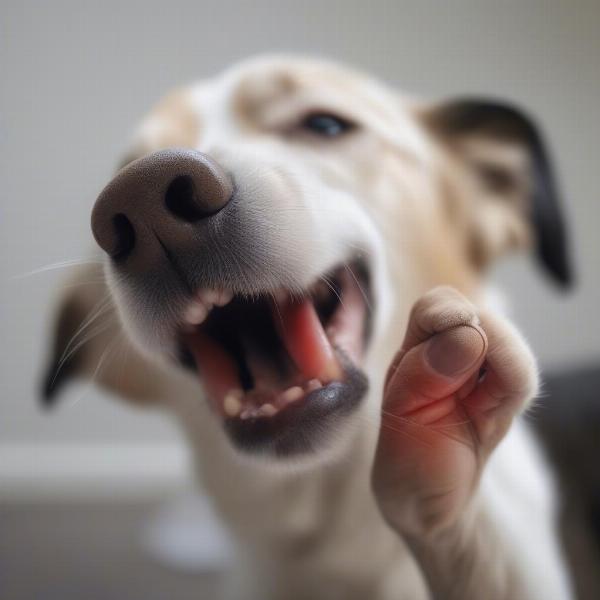Dogs lick. It’s a fact of life. From a playful lick on your hand to a persistent grooming session, licking is a natural canine behavior. But what does it really mean when your dog is a “licker dog”? This comprehensive guide dives into the various reasons behind your dog’s licking habits, helping you decipher this common canine communication.
While some licking is perfectly normal, excessive licking can sometimes indicate underlying issues. We’ll explore the motivations behind your dog’s licks, from affection and anxiety to potential medical concerns. Understanding the “why” behind the lick will allow you to better address your dog’s needs and ensure their overall well-being. Whether it’s a quick lick or a full-blown slobber-fest, we’ll help you decode your dog’s licking language.
Deciphering the Lick: Common Reasons for Dog Licking
So, why is your dog such a licker? Several factors can contribute to this behavior. One common reason is simple affection. Just like humans hug or kiss to show love, dogs may lick you as a way of expressing their bond. It releases endorphins, creating a calming and pleasurable sensation for both the dog and the recipient.
Another reason for licking is anxiety. If your dog is feeling stressed or nervous, they might lick excessively as a self-soothing mechanism. Changes in routine, loud noises, or separation anxiety can all trigger this behavior.
Medical Reasons Behind Excessive Licking
Sometimes, excessive licking can be a sign of an underlying medical problem. Allergies, skin irritations, or even pain can cause a dog to lick the affected area relentlessly. It’s important to rule out any medical causes if your dog’s licking seems out of the ordinary. Consult your veterinarian for a thorough checkup and diagnosis.
Licking as a Communication Tool
Dogs also use licking as a form of communication. Licking another dog’s face can be a sign of submission or a way to solicit food. P puppies often lick their mother’s mouth to encourage regurgitation. This instinctual behavior can sometimes carry over into adulthood.
Addressing Excessive Licking: Tips and Tricks
If your dog’s licking is becoming a problem, there are several things you can do to help. First, try to identify the underlying cause. Is your dog stressed? Bored? In pain? Once you pinpoint the trigger, you can start addressing the issue.
For anxiety-related licking, consider creating a calm and predictable environment for your dog. Provide plenty of mental and physical stimulation through exercise, playtime, and interactive toys. Training can also help build confidence and reduce anxiety.
 Dog licking paw due to allergy
Dog licking paw due to allergy
slicker brush for dogs can be useful for grooming. If medical issues are suspected, a visit to the vet is crucial.
Training Techniques to Curb Licking
Training can be a valuable tool in managing excessive licking. Teaching your dog alternative behaviors, such as chewing on a toy or sitting for a treat, can help redirect their attention away from licking. Positive reinforcement methods, such as rewarding desired behaviors with praise and treats, are typically the most effective.
Conclusion: Understanding Your Licker Dog
Understanding why your dog licks is key to addressing any potential underlying issues and strengthening your bond. By paying attention to the context and frequency of your dog’s licking, you can gain valuable insights into their emotional and physical well-being. Remember, while some licking is a natural part of canine behavior, excessive or obsessive licking should be addressed to ensure your furry friend’s health and happiness.
FAQ: Common Questions About Dog Licking
-
Why does my dog lick my face? Licking your face can be a sign of affection, submission, or even a way to taste the salt on your skin.
-
Is it safe to let my dog lick my wounds? While dog saliva does contain some antibacterial properties, it’s generally not recommended to let your dog lick open wounds as it can introduce bacteria and delay healing.
-
How can I stop my dog from licking excessively? Identify the underlying cause of the licking, such as anxiety or allergies, and address it accordingly. Training and environmental enrichment can also be helpful.
-
When should I be concerned about my dog’s licking? If your dog’s licking seems excessive, persistent, or is directed at a specific area of their body, it’s best to consult your veterinarian.
-
Can licking be a sign of boredom? Yes, dogs may lick out of boredom or frustration. Provide plenty of mental and physical stimulation to keep them engaged.
-
Why does my dog lick the air? Air licking can be a sign of stress, nausea, or even a neurological issue. If you notice this behavior, consult a veterinarian.
-
Why does my dog lick the carpet? Carpet licking can be triggered by anxiety, boredom, or even the presence of food particles or cleaning products.
slick brush dog is another useful grooming tool.
Expert Insight from Dr. Emily Carter, DVM: “Excessive licking can be a tell-tale sign of underlying issues in dogs, ranging from allergies to anxiety. Don’t dismiss it as just a quirky habit; investigate the root cause to ensure your pet’s well-being.”
Expert Insight from Dr. Sarah Jones, Certified Applied Animal Behaviorist: “Redirecting your dog’s attention with interactive toys and engaging activities can be an effective strategy to curb excessive licking related to boredom or stress.” yellow rain slicker for dogs is a practical item for walks in wet weather.
ILM Dog is your trusted source for expert dog care advice. We offer valuable resources on dog breeds, health, training, nutrition, grooming, and much more. From puppy care to senior dog support, we’re here to guide you every step of the way. dog clicker nz are useful for training. Contact us for personalized guidance and support. Email: [email protected], Phone: +44 20-3965-8624. ILM Dog is committed to helping you provide the best possible care for your furry companion.